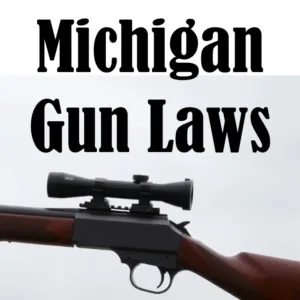Michigan has a range of firearm laws governing the purchase, carry, and use of firearms, along with restrictions on specific weapons and carry locations. This guide provides an in-depth overview of Michigan’s gun laws, covering purchase requirements, concealed carry permits, open carry rules, restricted locations, and self-defense laws.
Michigan Gun Laws Overview

Purchasing Firearms in Michigan
Michigan allows relatively straightforward firearm purchases, with certain requirements for handgun purchases and background checks for both private and licensed dealer sales.
Key Requirements:
- Permit to Purchase: Michigan requires a License to Purchase (LTP) for handguns unless the buyer has a concealed pistol license (CPL). Long gun purchases do not require a permit.
- Background Check: Background checks are mandatory for all firearm purchases through licensed dealers. Private handgun sales also require a background check.
- Waiting Period: Michigan does not impose a waiting period for firearm purchases.
- Minimum Age: Federal law sets the minimum age at 18 for long guns and 21 for handguns.
License to Purchase (LTP) for Handguns
In Michigan, those without a CPL who wish to buy a handgun must obtain a License to Purchase (LTP) from their local law enforcement agency. The LTP is valid for 30 days.
Steps to Obtain an LTP:
- Eligibility Requirements: Must be at least 21 years old and pass a background check to obtain the LTP.
- Application Process: Applicants complete the application with local law enforcement.
- Background Check: A federal background check is performed before issuing the LTP.
Open Carry in Michigan
Michigan permits open carry for individuals who legally own a firearm, meaning no permit is required to open carry in most public areas.
Key Points on Open Carry:
- Permitless Open Carry: Open carry of handguns and long guns is allowed for those legally permitted to possess firearms, with age requirements varying based on ownership status.
- Restricted Areas: Open carry is not allowed in certain locations, such as schools, government buildings, and private property where firearms are prohibited.
- Vehicle Carry: Open carry in a vehicle requires a CPL for handguns.
Concealed Carry in Michigan
Michigan is a “shall-issue” state, meaning that authorities must issue a concealed pistol license (CPL) if the applicant meets the requirements. A CPL is required for carrying a concealed firearm.
How to Obtain a Concealed Pistol License (CPL):
- Eligibility Requirements: Applicants must be at least 21 years old and pass a federal background check. They must also meet residency requirements.
- Training: Completion of an eight-hour state-approved firearms safety course is mandatory.
- Application Process: Submit the application at the county clerk’s office with proof of training, fingerprinting, and required fees.
- Renewal: CPLs are valid for four to five years and require renewal before expiration.
Reciprocity with Other States
Michigan honors concealed carry permits from other states that have reciprocal agreements with Michigan. Individuals traveling to Michigan with an out-of-state concealed carry permit should verify whether their permit is recognized.
Restricted Locations for Carrying Firearms in Michigan
Michigan restricts firearm carry in specific locations, even for those with a CPL.
- Schools and University Campuses: Firearms are prohibited on K-12 school grounds and certain parts of college campuses.
- Government Buildings: Firearms are not allowed in courthouses, police stations, and other designated government facilities.
- Private Property: Property owners can prohibit firearms on their premises, and posted signage should be respected.
- Places of Worship: Firearms are restricted in places of worship unless specific authorization is provided.
Assault Weapons and Magazine Capacity in Michigan
Michigan does not impose additional state restrictions on assault weapons or magazine capacity beyond federal regulations. Residents can own various types of firearms and magazines without state-imposed limits.
Self-Defense Laws in Michigan: Castle Doctrine and Stand Your Ground
Michigan has a Stand Your Ground law, allowing individuals to use force, including deadly force, if they believe they face an immediate threat of harm, even in public settings. Michigan also has Castle Doctrine protections for self-defense within one’s home.
Stand Your Ground
Michigan’s Stand Your Ground law states that individuals have no duty to retreat when they are in a place they have the legal right to be and face an immediate threat of harm.
Castle Doctrine
The Castle Doctrine applies within an individual’s home or dwelling, allowing them to use force against intruders if they feel threatened.
Firearms Prohibited Persons in Michigan
Michigan restricts firearm ownership for individuals who meet specific criteria.
- Felony Convictions: Individuals with felony convictions are generally prohibited from possessing firearms.
- Domestic Violence Convictions: Those with domestic violence convictions or active restraining orders may not own firearms.
- Mental Health Restrictions: Persons involuntarily committed for mental health treatment may face restrictions on firearm ownership.
- Substance Abuse: Certain drug or alcohol-related offenses may lead to temporary restrictions on firearm ownership.
Penalties for Violating Gun Laws in Michigan
Violating Michigan’s firearm laws can result in various penalties, including fines, jail time, and loss of firearm rights. Common violations include:
- Unlawful Possession: Possessing a firearm without meeting legal criteria can lead to criminal charges.
- Carrying in Restricted Areas: Bringing a firearm into restricted areas, such as schools or government buildings, may result in legal penalties.
- Failure to Obtain Required Permits: Failure to obtain an LTP or CPL when necessary can lead to fines or imprisonment.
Conclusion: Understanding Michigan’s Gun Laws
Michigan offers residents the ability to carry firearms with fewer restrictions than many other states, but it still enforces specific regulations regarding permits, restricted locations, and self-defense rights. Michigan residents should be well-versed in these requirements to ensure responsible firearm ownership and compliance with the law.
FAQs About Gun Laws in Michigan
1. Do I need a permit to buy a gun in Michigan?
You need a License to Purchase for handguns unless you have a CPL. Long guns do not require a permit.
2. Is open carry allowed without a permit in Michigan?
Yes, open carry is permitted without a permit, but there are restrictions in certain locations.
3. Does Michigan restrict magazine capacity?
No, Michigan does not impose magazine capacity limits.
4. Does Michigan recognize out-of-state concealed carry permits?
Yes, Michigan has reciprocity agreements with certain states.
5. What self-defense laws apply in Michigan?
Michigan has Stand Your Ground and Castle Doctrine laws for self-defense in the home and public settings.
